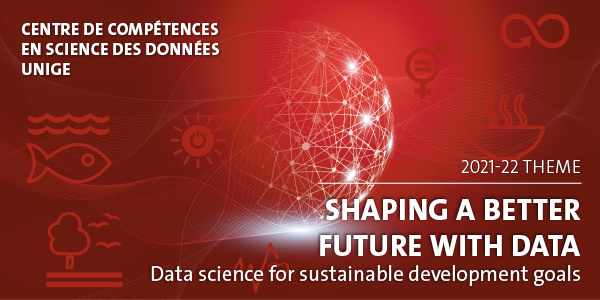UNIGE Data Science Day 2021

The UNIGE Data Science Day is a scientific symposium for researchers at the UNIGE, which takes place at the beginning of the academic year.
Each year, the CCSD aims to stimulate a collective reflection on a particular theme. This reflection is introduced during the UNIGE Data Science Day and continued in the framework of other activities launched by the Center throughout the year. This theme is intended to be precise enough to encourage a significant scientific contribution and a rich dialogue, but also transversal enough to allow for interdisciplinarity.
For its 2021-22 edition, the theme of Data Science Day is "Shaping a Better Future with Data: Data Science for Sustainable Development Goals".
This meeting took place on September 16, 2021 from 8:30 am to 6:00 pm.
Discover the program and watch the presentations of the 2021 edition >>
2021-22 Theme: data science and sustainable development goals
Global warming, growing inequalities, destruction of ecosystems, the return of authoritarianism, the race to industrialize and urbanize... The contemporary challenges facing our societies are expressed, to an ever-increasing extent, on a global scale. The development of effective initiatives to face these challenges must be thought of on the same scale.
With this in mind, in 2015, the United Nations member heads of state and government adopted the resolution "Transforming our world: the 2030 Agenda for Sustainable Development". This program constitutes the global reference framework for sustainable development, with the aim of eradicating extreme poverty and hunger, fighting against the degradation of the planet and promoting peace and prosperity. To do so, it sets 17 Sustainable Development Goals (SDGs) and 169 targets to be achieved by 2030.
Integrated and indissociable, the SDGs consider social, economic and environmental dimensions in a balanced way, thus making their achievement conditional on a detailed understanding of complex and interdependent systems. This requirement has contributed to giving the data-driven approach a central place in the elaboration of public policies in favor of sustainable development, on a global, national and regional scale. However, such an approach requires access to quality data in each of these fields of action, but also, and above all, the ability to effectively analyze these diverse data sets (socio-economic, environmental, agricultural, energy, demographic, etc.) in a relevant manner.
In this respect, data science is a central tool that can contribute to the achievement of the SDGs: in addition to dealing with issues related to data collection, it also makes it possible, through the application of specific methods, techniques and practices, to solve complex, unstructured and data-rich problems.
In scientific research, data science is already involved in many ways in the pursuit of the SDGs, either explicitly or implicitly. Statistical and computational sciences in particular can work to develop innovative methods and tools for significant advances in the way certain complex problems are addressed. Totally or partially automated, data collection can now be done on ever larger sets, with ever more powerful tools. However, the question of data access and interoperability is at the heart of work on ontologies and standardization. What role can data science play in maintaining data sets that are useful for the pursuit of the SDGs? The generalization of digital tools also opens new perspectives in the expansion of the potential of participatory science, and of the role of citizens in the collection and description of data useful for scientific research. Downstream, the complexity of statistical models and their cross-disciplinary use in a multitude of disciplines allows for more refined analyses. Insofar as learning algorithms are applied to relevant bodies of data, for well thought-out problems, the expression "AI for Good" is not just a slogan and can be a reality. These methods can indeed help, in some cases, to anticipate economic, political and environmental evolutions in a complex way, taking into account numerous factors - and notably human ones. The application of these techniques is not without consequences, however, as there may be a risk in trying to approach sustainable and social development issues through purely quantitative approaches and generative applications. Does the quantification of reality appear to be sufficient to grasp the challenge of the SDGs? Critical reflections on its limits, notably by the social and political sciences and the humanities, or linked to ethical and legal considerations, should help refine these analyses. The final objective, the transformation of public policies and even modes of governance, and the establishment of incentives for more sustainable individual and collective actions, probably depends on an intelligent conjunction of all approaches.
In order to support and promote these perspectives, the Competence Center in Data Science of the University of Geneva intends to articulate its reflection for the year 2021-2022 around the theme: "Shaping a Better Future with Data: Data Science for Leveraging Sustainable Development Goals". This interdisciplinary, technical and critical reflection will focus, on the one hand, on data and innovative methods in data science entering the study of the many fields of research covered by the SDGs and, on the other hand, on the legal, political, social, economic and ethical issues of the use of quantitative data in the management of global challenges. In this context, the aim is to give increased visibility to projects already initiated by UNIGE researchers, in order to foster interdisciplinary dialogue, but also to give an impulse to the creation of new interdisciplinary projects on themes linking data science and the SDGs.
A call for participation in the UNIGE Data Science Day 2021, which will be held on 16 September 2021, and a call for projects, for an impulse fund of CHF 15,000, are launched for the UNIGE research community, all disciplines included.
